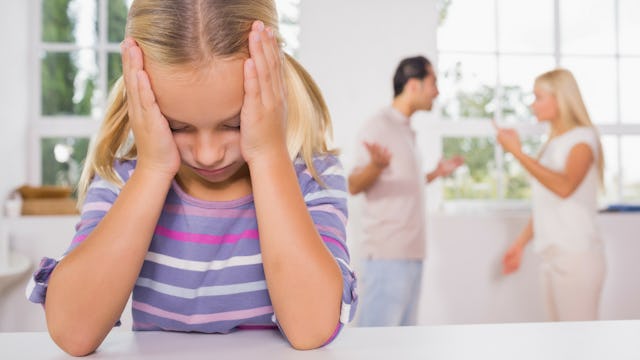I Grew Up With Family Dysfunction, But This Is How I'm Breaking The Cycle

I grew up in a home with two parents who didn’t want to be married to one another. They both felt stuck and frustrated, and dealt with it by getting drunk and screaming at each other every single day.
They each subscribed to this ideal that sticking together for the kids would somehow be better for my sister and me, but we both believe our childhoods would’ve been much happier if they’d split up sooner.
They would have the same fights, again and again. Sometimes they’d get physical. (I have a very distinct memory of cleaning up a shattered mirror in the living room after my dad through a chair at the front door after my mom stormed out. I was only seven.)
But mostly, the damage was emotional. Here were two adults who both came from abusive environments, and didn’t have any idea how to truly love someone, even themselves. They each tried to end the cycle of dysfunction, but they could never fully break free.
Thankfully, my sister and I have been able to break the cycle of abuse with our own families, but we each had to take the long way to get here. As teenagers, we were drawn to men who were abusive, because we had a very broken understanding of what love was. Those lessons are like scars; they never fully heal and are always around to remind you what love isn’t.
So how do you begin to heal wounds caused by the people who are supposed to love and protect you at all costs? How can you begin to break away from the cycle of dysfunction?
1. Be your own advocate.
One thing I’ve learned is that people will treat you how you let them treat you. If you feel you can’t speak up for your own wants and needs to someone, then maybe it’s best to distance yourself from that person. People who genuinely love you want you to succeed. If people tear you down when things don’t go well, that is not love, that is control. You deserve better.
2. Listen to the friends you trust.
Nobody knows the dynamic of a relationship except the two people in it. But sometimes we are blinded by our own feelings. We romanticize the good and we choose not to acknowledge the bad. Your friends might be able to see certain red flags because they have a) a unique perspective and b) your best interest in mind. So, listen to them if they voice concerns.
3. Get out of the bubble.
Changing your environment and perspective is so important. Literally, if you can. Travel as much as possible to different places and different cultures. Can’t afford to travel? Read as much as you can. Be a sponge and soak up everything that you observe. Get lost and discover yourself all over again. Find your own strength.
4. Decide what love means for you.
I know it sounds cheesy, but you really do have to learn to love yourself before you can truly love someone else. Real love is about kindness, respect, forgiveness, humor, and vulnerability. And you can’t learn to do those things for others until you can do them for yourself first.
5. Set boundaries.
It’s not easy to continue relationships with family once you’ve been able to separate yourself from the abuse cycle. Set boundaries for others about what behavior is expected and appropriate. Set boundaries for yourself, about who you let into your own space or how much time or energy you’re willing to spend on something before you let go. Be prepared to cut ties if needed, because abusers do not respond well to boundaries.
You deserve love that nurtures and empowers you, and that starts with the love you learn to give yourself. Trust yourself, and listen to your instincts.
Nobody should feel like love means feeling like you’re disrespected or unsafe. That’s not love; that’s abuse. But committing to breaking that cycle of dysfunction can help change your world, and it’s never too late to live your best life.